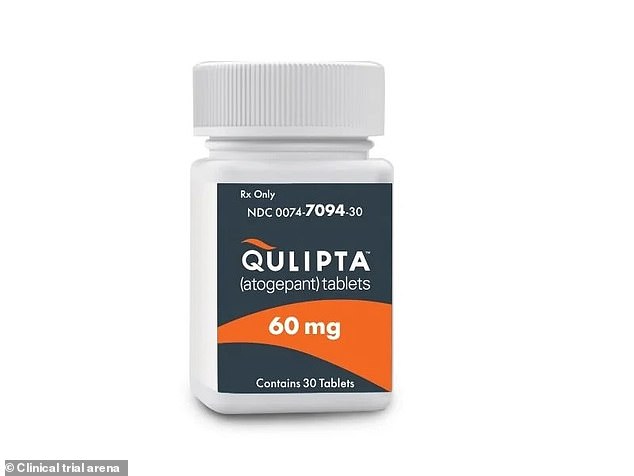Essential guide to treating and preventing migraines
It is being hailed as a ‘life-changing’ drug that could be a boon to tens of thousands of Britons who suffer from migraines.
According to rigorous studies, Atogepant can halve the number of paralyzing attacks patients suffer.
The pill taken once a day works by blocking the receptor of a protein found in the sensory nerves of the head and neck, known as the calcitonin gene-related peptide (CGRP). This protein causes blood vessels to dilate, which can lead to inflammation and migraines.
It will be an option for people who have at least four migraine days a month and have tried at least three other treatments without results.
But doctors say there are some other simple steps you can take — in combination with medications — to prevent the pain of migraines.
And there are also ways to possibly stop them…
Migraines can last between two hours and three days, the NHS says. Patients sometimes experience warning symptoms such as fatigue, cravings for certain foods, mood swings, and a stiff neck before a migraine strikes
How to treat a migraine
Migraines usually feel like a very bad headache and cause a throbbing pain on just one side of your head, the NHS says.
Patients sometimes experience warning symptoms such as feeling tired, craving certain foods, mood swings, or a stiff neck before a migraine strikes.
Others develop problems with their vision, feel dizzy or even have difficulty speaking.
Attacks can last between two hours and three days, the NHS says.

A new pill taken once a day called Atogepant could halve the number of migraines people suffer from
“Unfortunately, there is no cure for migraines, but I work with patients to try to manage their symptoms, such as reducing sensitivity to light by sleeping or lying in a darkened room,” Dr. Hana Patel said, the London-based NHS GP, told MailOnline.
That’s because noises and bright lights can often make migraines worse.
“Normally there is a process of working with your GP to find the best combination to control symptoms, and every migraine patient will have different symptoms,” Dr Patel said.
Taking painkillers such as ibuprofen and paracetamol can help reduce pain in some cases, the NHS says.
Other patients are on triptans, medications that act like serotonin: the “feel good” chemical in the brain that helps calm overactive pain nerves.
Some people also take medications in combination with anti-nausea medications that help keep you from feeling nauseous or getting sick, an unpleasant side effect of migraines.
Dr. Patel said, “People can manage their migraine pain symptoms with over-the-counter medications and anti-inflammatory medications.
‘They are usually most effective if taken at the first sign of a migraine attack.
‘This gives them time to absorb into your bloodstream and relieve your symptoms.
‘Other treatments include anti-nausea medications, which can be effective even if you do not experience nausea or vomiting.’
Lifestyle changes may also be suggested by your doctor to help manage painful migraines, such as getting enough sleep, eating at regular times and drinking less caffeine.

Taking painkillers such as ibuprofen and paracetamol can help reduce pain in some cases, says the NHS
Lifestyle changes to prevent migraines
Knowing what causes migraines and making lifestyle changes to alleviate them can help stop migraines.
‘As with anything, it’s helpful to be aware of what’s causing your symptoms, and perhaps even keep a migraine or headache diary, to try to find triggers and avoid or reduce them to prevent migraines,’ says Dr. Patel.
According to the NHS, some foods can be a trigger for migraines.
So it can help to keep track of which foods or drinks may be causing them.
It also helps to stay hydrated and limit the amount of caffeine and alcohol you drink, the NHS says.
It adds that maintaining a healthy weight, eating regularly, exercising and sleeping regularly and managing your stress are all factors that can reduce migraines.
Dr. Echoing the NHS advice, Patel said: ‘Some other general advice is to get regular exercise, sleep and eat well-balanced, regular meals.
‘Try to make sure you stay well hydrated and limit your caffeine and alcohol intake.’
